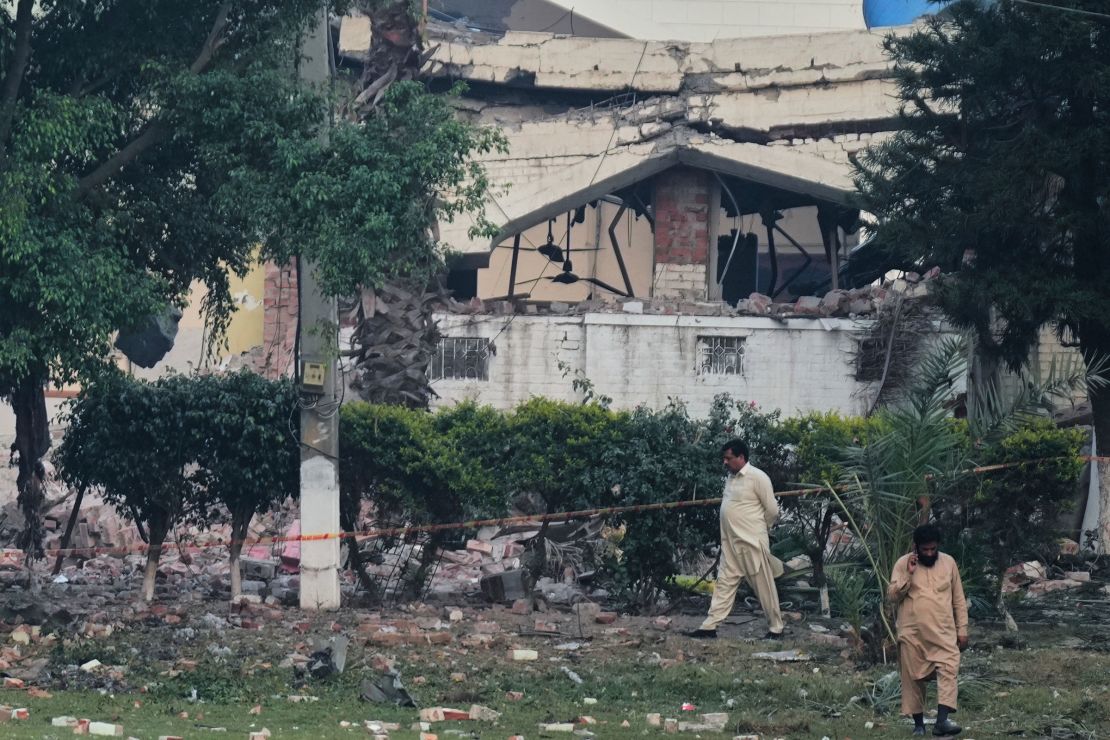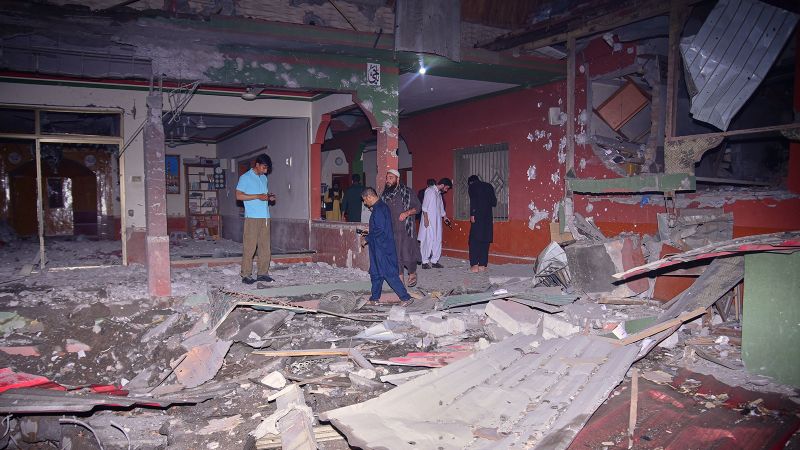Islamabad, Pakistan / New Delhi, India
CNN
—
India launched military strikes on targets in Pakistan, both countries said on Wednesday, with Pakistan claiming it had shot down five Indian Air Force jets in response, in a dangerous escalation between the nuclear-armed rivals.
India’s missile strikes early Wednesday morning targeted “terrorist infrastructure” across nine sites deep in Pakistan’s densely populated Punjab province and Pakistan-administered Kashmir, it said. They come more than two weeks after a massacre of tourists in Indian-administered Kashmir that New Delhi blamed on its neighbor.
Pakistan said eight people were killed in Wednesday’s strikes – including women and a three-year-old girl – and 35 wounded after six locations were targeted, in what the country’s Prime Minister Shehbaz Sharif described as “an act of war.”
The escalation puts India and Pakistan, two neighbors with a long history of conflict, in dangerous territory, with Islamabad vowing to retaliate against New Delhi’s strikes and the risk of tit-for-tat responses spiraling into an all-out war.
Indian jets have previously bombed Pakistani territory during bouts of rising tensions but Wednesday’s operation is the deepest India has struck inside its neighbor since the Indo-Pakistan war of 1971, the biggest of several wars between the two countries.
The situation is now “obviously serious and fluid,” said Fahd Humayun, an assistant professor of political science at Tufts University. “Retaliation to India’s actions will likely now be inevitable.”
The Indian Army, which dubbed its military action Operation Sindoor, declared “Justice is served,” on X. “Jai Hind!” it added, meaning “Victory to India.”
But world leaders have expressed concern over the operation and have urged restraint from both countries, with United Nations Secretary-General Antonio Guterres warning that “the world cannot afford a military confrontation between India and Pakistan.” The US Department of State said it was “closely monitoring” the flare-up.
Muslim-majority Pakistan and Hindu-majority India have inched closer to open conflict since the massacre last month, with India’s Hindu-nationalist government under intense pressure from its base to respond to the attack, in which gunmen killed 25 Indian tourists in a popular holiday spot.
Pakistan says it shot down five Indian Air Force jets and one drone in “self-defense,” claiming Rafale jets – sophisticated multi-role fighters made in France – were among those downed as well as a MiG-29 and an SU-30 fighter. Indian authorities have not yet confirmed any planes lost. CNN cannot independently verify the claim and has reached out to the Indian government for a response.
However, a local resident and government official told CNN that an unidentified fighter aircraft had crashed on a school building in Indian-administered Kashmir, in the village of Wuyan.
“We heard the sound of a flying plane and then there was a big explosion. We rushed out of our homes in panic and saw it was on fire. Luckily no one was injured,” said Wuyan resident Abdul Rashid.
Photos published by AFP news agency showed aircraft wreckage lying in a field next to a red-brick building. But it was not immediately clear from the pictures of the wreckage who the aircraft belonged to.
Witnesses in Indian-administered Kashmir’s biggest city Srinagar had previously told CNN that a blast had rocked the city, around the time when India said it was conducting airstrikes against Pakistan.
The strikes have put the region on alert, with commercial airlines keeping almost entirely clear of Pakistani airspace, flight-tracking website Flightradar24 showed. The airport in Srinagar has been closed to civilian traffic, and several airlines have suspended or diverted flights to Pakistan and northwest India.
Hospitals have been put on alert in Pakistan’s Punjab and schools have closed in both Pakistan and Indian territory.
India has defended its military operation in Pakistan, claiming that its actions in response to last month’s massacre were “focused, measured and non-escalatory in nature.”
“No Pakistani military facilities have been targeted. India has demonstrated considerable restraint in selection of targets and method of execution,” India’s defense ministry said in a statement.
Pakistan has denied any involvement in the attack on the tourist spot of Pahalgam. It has also rejected India’s claim, saying Wednesday’s strikes largely harmed civilians and targeted mosques across six locations in its territory.
Pakistani Prime Minister Sharif said his country “has every right to give a befitting reply.”
“The Pakistani nation and the Pakistani Armed Forces know how to deal with the enemy very well,” the prime minister’s office said in a statement. “The enemy will never be allowed to succeed in his nefarious objectives.”
The Indian Army said three civilians in Indian-administered Kashmir were killed in shelling by Pakistani troops from across the Line of Control that divides the disputed territory of Kashmir.

“The world must show zero tolerance for terrorism,” India’s Foreign Minister Subrahmanyam Jaishankar said in a post on X.
From early Wednesday the two sides have exchanged shelling and gunfire across their border and a CNN journalist in Pakistan-administered Kashmir heard multiple loud explosions.
Senior Indian officials have spoken with counterparts in a number of countries to brief them on the steps taken by New Delhi, a senior Indian government official told CNN. Among the countries briefed were the United States, United Kingdom, Saudi Arabia, United Arab Emirates and Russia.
US President Donald Trump called India’s operation “a shame,” and that he hopes “it ends very quickly.” Meanwhile, Secretary of State Marco Rubio spoke to the national security advisers from India and Pakistan and urged “both to keep lines of communication open and avoid escalation,” a statement said.
The UAE has asked for both countries “to exercise restraint, de-escalate tensions, and avoid further escalation that could threaten regional and international peace,” according to a statement.
Kashmir is one of the world’s most dangerous flashpoints. It is controlled in part by India and Pakistan, but both countries claim it in its entirety.
India and Pakistan have fought three wars over the mountainous territory since their independence from Britain in 1947, the most recent in 1999. And the divided region is now one of the most militarized places in the world.
For decades, several domestic militant groups, demanding either independence for Kashmir or for the area to become part of Pakistan, have fought Indian security forces, leaving tens of thousands killed in the violence.
India has long accused Pakistan of harboring these militant groups – a charge Islamabad denies – and had vowed to retaliate against those they deemed responsible.
Tensions over Kashmir have also surged in recent years, after Indian Prime Minister Modi’s government revoked the region’s constitutional autonomy in 2019, bringing it under the direct control of New Delhi.
Wednesday’s operation is the first time India has conducted strikes inside Pakistan’s territory since 2019, when Indian jets targeted multiple locations after it blamed Islamabad for a suicide car bomb attack that killed at least 40 Indian paramilitary personnel in the region.
The massacre in Pahalgam sparked immediate widespread anger in India, putting Modi and his Bharatiya Janata Party (BJP) under tremendous public pressure to retaliate with force.
“Modi and his government believe it is imperative to respond to Pahalgam,” said Derek J. Grossman, a senior defense analyst at the RAND Corporation, a US-based think tank.
“Indians are very likely to support New Delhi’s response – regardless of what it is, perhaps except for a nuclear response – because they believe Pakistan must be deterred in the future.”
In the days after the tourist attack, both countries swiftly downgraded ties with each other and have since been engaging in escalating tit-for-tat hostilities.

